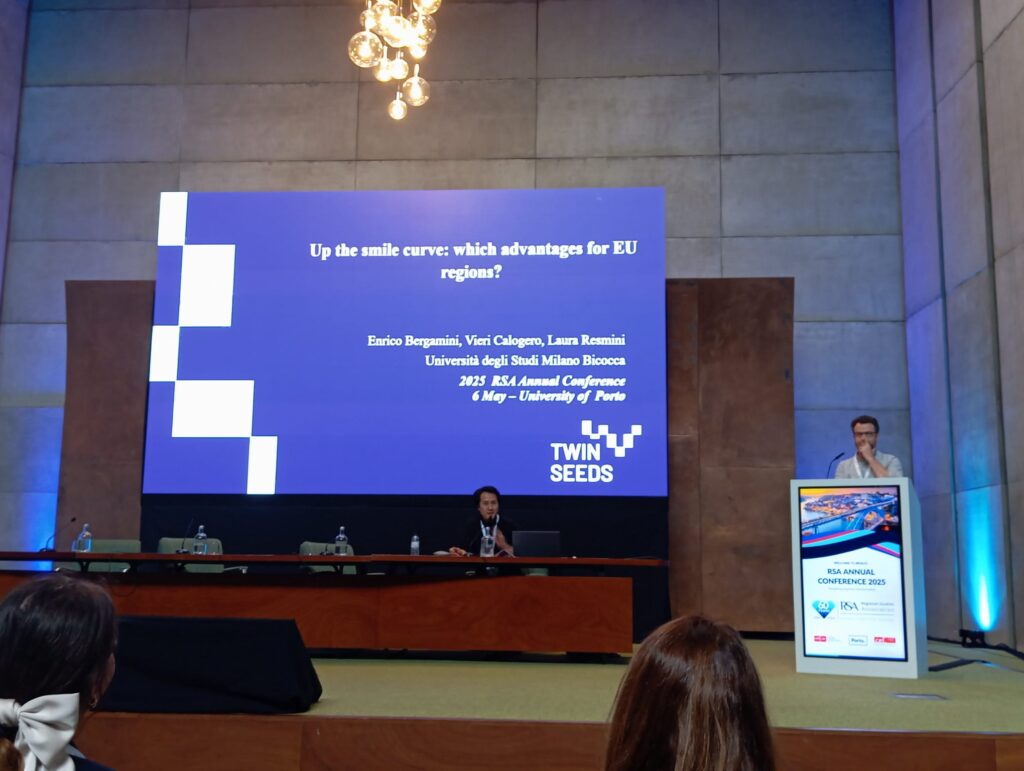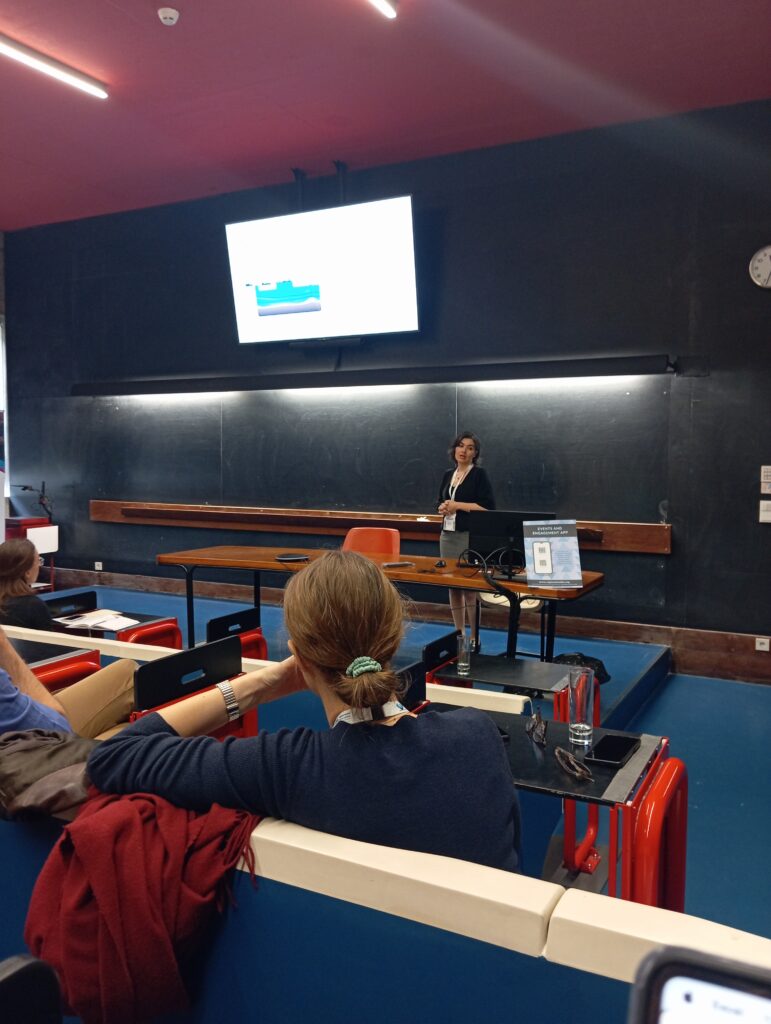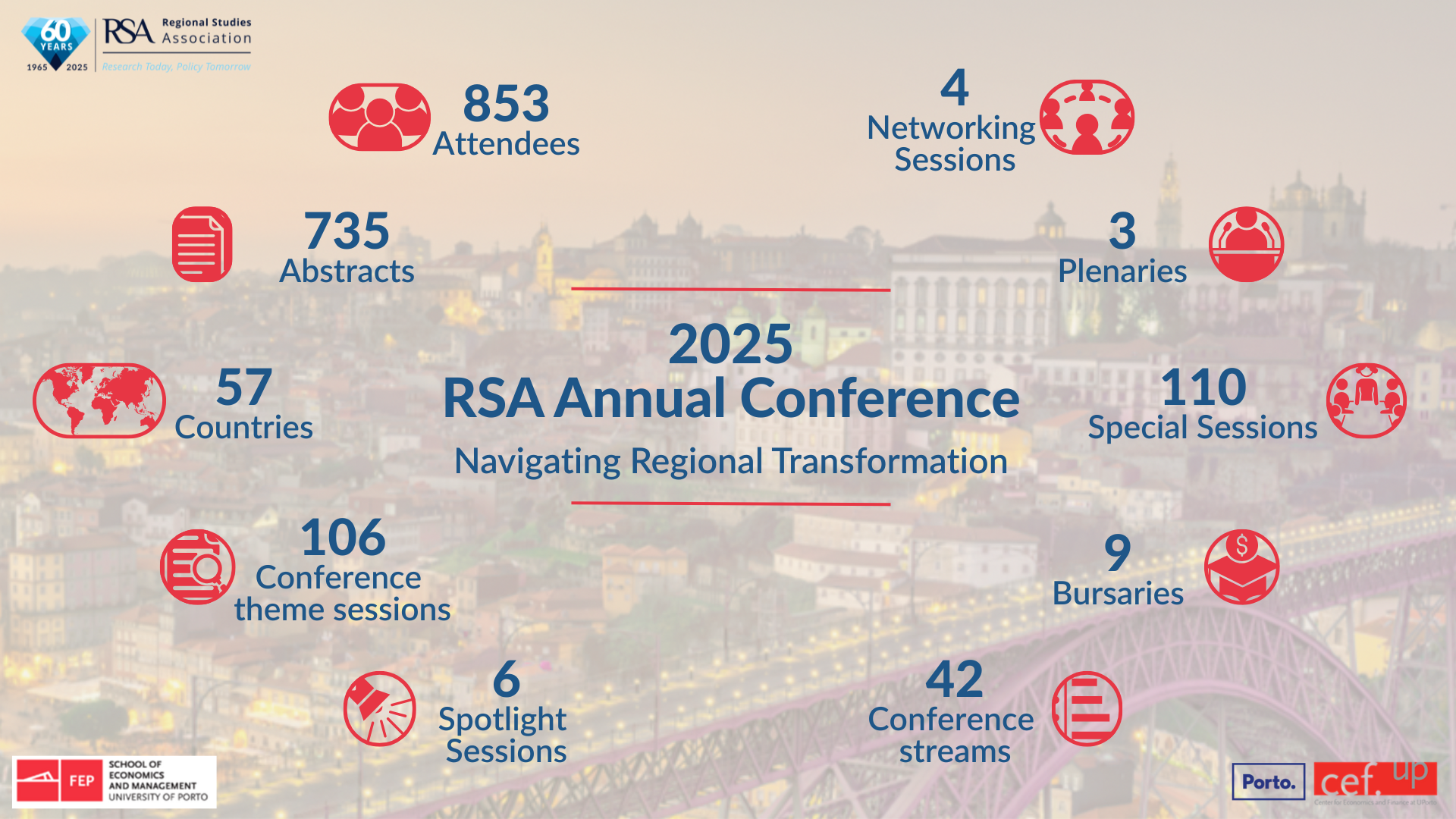RSA Events – Event report V RSA Annual Conference, Value Chains, Foreign Investment, Innovation and KIRDSA special session
2025 RSA Annual Conference
Navigating Regional Transformation
University of Porto, Portugal
6 May 2025 – 9 May 2025

This report presents a summary of contributions and key discussions from sessions held under the themes of:
- Value Chains and Foreign Investment
- Innovation and Technological Change
- KIRDSA special session
Session Report: Value Chains and Foreign Investment
- Date: Wednesday, May 7
Chair: Yi Liu, Sun Yat-sen University, China
This session brought together leading scholars to explore how foreign direct investment (FDI) and global production networks (GPNs) shape European regions’ economic, technological, and social outcomes. The discussion spanned the implications of regional positioning in global value chains (GVCs), the dynamics of wage inequality, and the integration of advanced technologies through inward investment. Each presentation concluded with a Q&A by Chair (Louis) Yi Liu.
Presentation Summaries:
- “UP the Smile Curve: What Advantages for European Regions?”
Vieri Calogero, Ph.D., University of Milano-Bicocca
Calogero opened the session by examining the potential benefits of functional upgrading within the global value chains of European regions by moving “up the smile curve” from the production process to higher-value-added activities. The findings clearly link upgrading, economic performance, and regional competitiveness.
- “Global Networks, Local Inequalities: The Impact of GPN Participation on Wage Inequality in European Regions”
Enrico Bergamini, Università degli Studi di Milano-Bicocca
Bergamini presented research linking the integration of regions into GPNs with wage disparities. Using data from across the EU (NUTS2 level), the analysis shows that while GPN participation can boost overall regional economic performance, it often exacerbates wage inequality between skilled and unskilled workers. On one side, subsidiaries abroad offshore routine jobs, increasing job polarisation. On the other hand, foreign companies that established local subsidiaries contribute by offering high-wage jobs and creating new job opportunities.
- “Knowledge Sources for Industry 4.0 Technologies in European Regions: The Role of Inward FDIs”
Michela Bello, European Commission, Joint Research Centre
Bello’s presentation focused on how inward FDI functions as a knowledge vector, especially for Industry 4.0 technologies. Their empirical work highlighted that innovative FDIs are positively related to the backwards citations of EU Industry 4.0 technologies to foreign knowledge sources. The presentation includes a discussion about the policy implications of their results.
- “AI-Driven Transformation in Global Production Networks: Integrating Technological Capabilities with GPN Theory”
Sarah Franz, University of Gothenburg
Franz closed the session with a theoretical and empirical exploration of how artificial intelligence (AI) is reshaping global production networks. The paper integrates global production network (GPN) theory with insights from digital transformation literature. Based on longitudinal data collected over two years from four major Swedish multinational companies, the study examines how AI technologies enhance opportunities (like resilience and risk forecasting) and challenges for both lead firms and suppliers.
Session Report: Innovation and Technological Change – Green Innovation
Date: Wednesday, May 7
Chair: Gary Walpole, Cardiff Metropolitan University, UK
This session focused on the evolving landscape of green innovation, particularly emphasising regional dynamics, policy interactions, and firm-level strategies. Researchers presented diverse empirical and conceptual perspectives on how innovation systems adapt to environmental challenges and transition toward more sustainable pathways.
Presentation Summaries:
- “Wind Energy Industrial Path in Portugal: The Disturbing Effects of Offshore Wind Technology”
Hélder Santos, University of Porto / CEGOT
Santos examined the trajectory of wind energy development in Portugal, finding evidence about path-disturbing effects when new actors enter the activity. The presentation shows the geographical distribution of the activity in Portugal.
- “Eco-innovation and Green Patents in the Madrid Region: An Exploratory Analysis”
Simón Sánchez-Moral, Complutense University of Madrid
Sánchez-Moral presented an exploratory study of environmental innovation patterns in Madrid, focusing on environmental patents’ spatial and sectoral distribution (Y02 category in PATSAT data). The preliminary results show a concentration of green innovation activities within specific industries and the emerging role of green innovation hubs. Some policy implications regarding the geographical concentration of innovation activities were discussed.
- “Exploring Regional Twin Transition Pathways with an Empirical Agent-based Model on Knowledge Creation”
Theresa Bürscher, Austrian Institute of Technology
Bürscher introduced an empirical agent-based model designed to simulate how regions simultaneously navigate digital and green transitions—the so-called “twin transition.” She presented different scenarios and their associated results, aiming to shed light on policy recommendations.
- “Corporate Visions, Knowledge Creation and Patents: The Cases of Chinese Electric Vehicle Battery (EVB) Makers”
Godfrey Yeung, National University of Singapore
Yeung proposed an analytical framework for the relationship between corporate visions and knowledge creation. They refer to the Chinese EV battery manufacturers. Through firm-level case studies, he demonstrated how corporate vision, state support, and patenting activity are interlinked in shaping global competitiveness in green technologies. His analysis suggested that the Chinese innovation model offers lessons and challenges for worldwide regional innovation systems.
Session Title: Innovation and Technological Change: Proximity and Patterns
Date: Thursday, May 8, 11:00 AM – 1:00 PM WEST
Session Chair: Alexandra Badort, LUISS, Italy
This session brought together scholars exploring the intersection of innovation, technology, and data in the context of societal and environmental transformation. Three presentations offered distinct perspectives on how technological advancements and infrastructure projects reshape access to information, industrial systems, and resource governance.
Presentation Summaries:
- Census Data: Innovations in Flow Data Retrieval Using Generative AI
Presenter: Vassilis Routsis, UCL
Routsis presented a pilot project integrating an experimental census API with a generative AI-driven pipeline to enhance data retrieval for large-scale, complex datasets. Routsis emphasised the potential for AI to complement traditional digital tools and to contribute to regional studies through more intuitive and flexible interfaces.
- Navigating Change: Ports, Energy Hubs, and the Longship Project
Presenter: Negar Safara Nosar, Western Norwegian University of Applied Sciences
Safara Nosar explored the role of the Longship CCS project in Norway in the transition toward low-carbon infrastructures. The study showed how Longship influences the trajectory of small and medium-sized industrial ports, enabling their evolution into low-carbon energy hubs. The presenter emphasised the importance of contextual variation across ports, resulting in differentiated local transition pathways.
- Tracking Critical Raw Material Patents with Large Language Models
Presenter: Francesco de Cunzo, Enrico Fermi Research Center
De Cunzo introduced a novel method for analysing patent data related to Critical Raw Materials (CRMs) using large language models (LLMs). By filtering CRM-related patent abstracts, the study categorises patents into functional groups: use, recycle, remove, refine, and incorrect mentions. This approach provides a systematic way to map innovation activity around CRMs and to identify emerging technological trends.
KIRDSA Special Session SS03 – Global Knowledge Flows and their Role in the Window of Opportunity for Latin America
Day: Friday, May 9
Chair: Andrea Belmartino (Università degli Studi di Sassari, Italy)
This special session explored the intersection of global knowledge flows with innovation, regional dynamics, and green technologies in Latin America. Through five insightful research presentations, the session examined how place-based policies, industrial transformations, sustainability goals, and support mechanisms at the regional level contribute to fostering innovation. The studies highlighted the importance of localised approaches to innovation, the uneven distribution of Industry 4.0 capabilities, the role of institutional networks, and the opportunities and risks associated with green transitions in the region.
The session drew an engaged audience of approximately 20 participants, who actively contributed to the discussion and expressed strong interest in the presented research. At the end of the session, KIRDSA organisers—Sergio Palomeque, Pablo Galaso, and Andrea Belmartino—announced the upcoming III KIRDSA Conference, scheduled to take place in Buenos Aires, Argentina, in February 2026. The announcement was warmly received, signalling growing momentum and enthusiasm within the KIRDSA community. More information about the conference will soon be available on the Regional Studies Association (RSA) website and shared via email and social media with all KIRDSA members.
Presentation Summaries:
- Evaluating Place-based Innovation Policy: Assessing the Long-Term Impact of a SME-Oriented R&D Grants Program in Brazil
Presenter: Renato Garcia (University of Campinas, Brazil)
Garcia presented an empirical assessment of an R&D grant PIPE program (Innovative Research in Small Businesses Program) by FAPESP, which supports small and medium-sized enterprises (SMEs) in the Brazilian State of São Paulo. Using patent data and a dose-response econometric approach, it finds that funded firms outperform non-recipients in innovation, with an optimal funding level identified through an inverted U-shaped curve. The research highlights the importance of time-lagged evaluations and shows that well-structured public R&D support can drive SME innovation, even in developing regions. It offers valuable insights for designing more effective, place-based innovation policies.
- Skill Diversification into Industry 4.0 in Brazilian Regions
Presenter: Igor Tupy (IPEA, Brazil)
Tupy’s presentation explored the regional diffusion of Industry 4.0 technologies and the evolving skill demands across Brazilian states. Findings show that diversification is concentrated in Brazil’s Southeast-South axis, particularly in São Paulo, with complex occupations less likely to spread regionally due to knowledge barriers. While development-related demographic factors were not decisive, the results highlight that Industry 4.0 diffusion relies on existing manufacturing bases and accumulated capabilities—not solely on high-tech or wealthy regions—emphasizing the role of technological maturity and human capital in fostering regional innovation.
- Support Networks for Local SMEs and Innovation Performance: Evidence from a Region in Latin America
Presenter: Pablo Galaso (Universidad de la República, Uruguay)
Galaso presented findings a study that examines SME innovation in Canelones, Uruguay, highlighting the crucial role of inter-firm cooperation and support organizations (SOs) in a developing regional context. Survey and network analysis reveal that strong SME-SO connections significantly boost the likelihood of innovation. The findings suggest that Canelones is well-positioned to implement policies supporting digitalisation and sustainability, using its robust SO network to foster a more competitive and innovative local business environment.
- Green Technological Innovation in Latin America
Presenter: Sergio Palomeque (Universidad de la República)
Palomeque presented a paper that examines the conditions that enable Latin American countries to develop new specialisations in green technologies, focusing on the role of existing knowledge bases—both green and non-green—and the influence of local and international collaboration networks. Drawing on the concept of technological relatedness and innovation networks, the study finds that countries are more likely to generate green innovations where related knowledge already exists, and that both domestic and global invention networks positively impact green technological specialisation. The research highlights how interconnected knowledge systems and collaborative structures shape the region’s capacity to advance in the green transition.
- Two Sides of the Same Coin? A Systematic Literature Review on the Green Window Opportunities and Hidden Risks of Critical Raw Materials in Latin America
Presenter: Andrea Belmartino (Università degli Studi di Sassari)
The paper reviews over two decades of literature on the dual role of critical raw materials (CRMs) in Latin America, essential for green technologies such as renewable energy and electric vehicles. While the region holds significant reserves of key CRMs like lithium, cobalt, nickel, and rare earth elements—offering opportunities for sustainable development—it also faces serious environmental, social, and ethical challenges linked to their extraction. The study highlights this tension between the potential of CRMs as “green window opportunities” and the “dark side” of innovation, offering a nuanced view of their impact on Latin America’s green transition.
The author of this report
Andrea Belmartino
Post-doctoral researcher
Università degli Studi di Sassari, Italy
Research focus: regional development challenges in the context of the sustainable transition.

Photos


Complementary reading
Conference Statistics

The Regional Studies Association’s Annual Conference 2025 #RSA25 was held in partnership with the School of Economics and Management at the University of Porto, Portugal. This four-day conference brought together academics and policymakers to exchange news, views and research findings from regional studies and science, regional and economic development, policy and planning. There was representation from 57 different global territories as we gathered established experts and early career researchers in the beautiful city of Porto.
The conference featured 750+ presentations, high-profile plenary speakers, several specially convened sessions, workshops, professional development and networking sessions, walking tours and field trips. The social programme included the conference dinner and a reception, side events, exhibitor stalls and post-conference tours to explore Porto.



